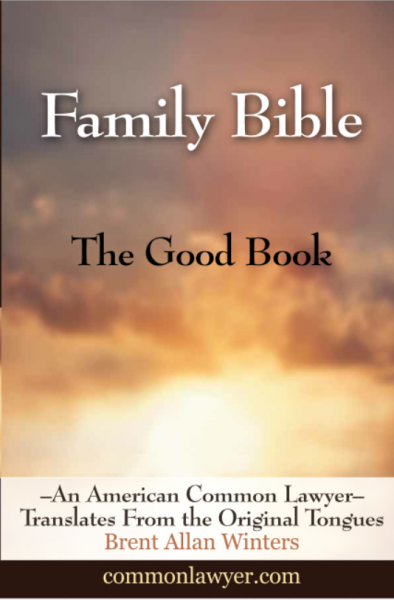Family Bible

Winters's Translation of the Bible Unannotated
Translated By Brent Allan Winters
A NEW TRANSLATION—NOT BASED ON ANY OTHER TRANSLATIONS—FROM THE ORIGINAL HEBREW, CHALDEE & GREEK TONGUES TOWARD A RAW TRANSLATION OF GOD'S WRITS
Published by Inn-Church Press Ministry (IPM)
This version is without Brent's annotations found in "The Good Book Uncooked."
In appreciation of a suggested donation of $100 (or more).
A Note about Common-Law Evidence
Family-Bible Records of Marriage, Birth, Death & Transfer of Land Rights
Both our common law of evidence and the laws of nature’s God demand the highest standards of safekeeping for evidence of rightful transfer and delegation of responsibilities in land, called land rights. In common-law countries, such as the United States, evidence of land rights are of local jurisdiction; hence, all such evidence is put to writing and has been traditionally stowed in a dedicated, fire-protected room of the county courthouse, where the land of which the land rights in question lies. In fact, our common law of the land holds rightful transfer of responsibilities respecting land fundamental to all rights, because every individual’s jurisdictional duties arise from the land and its law. Indeed, without law, there is no duty. And in our common-law country we call this duty-bearing law, the law of the land. Further, lawful transfer of such jurisdiction responsibilities in land is the natural course of family inheritance, demanding further, reliable evidence of marriage, birth, and death.
Of note, our common law holds that records of marriage, birth, death, and transfer of land rights written in one’s family Bible, are reliable evidence; and moreover, where such family Bible records are unrebutted by better evidence, our common law deems these records conclusive. Moreover, many states have recognized this common-law standard of evidence by legislation; the evidentiary reliability of family Bible records of marriage, birth, death, and land transfers remains substantially the same. Come what may, one does well not to rely only upon local county government to safekeep one’s family’s evidentiary records of marriage, birth, death, and transfer of land rights, but to record these on pages attached to the binding, within the covers one’s own Family Bible.
Several years ago, this common lawyer went to a local rural county courthouse to examine a client’s rights in land called mineral rights. Upon arrival, however, he learnt that the night before, fire had gutted parts of the old courthouse, burning such records. Family Bibles rose to the demand for reliable evidence respecting land rights, including records of birth, marriage, and death. Those having recorded written evidence of these events in their Family Bibles fared better in proving inherited land rights than those having no such reliable common-law evidence.
